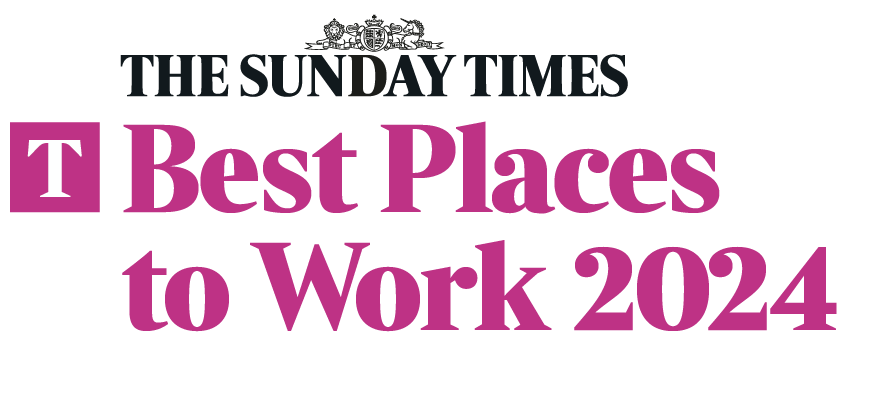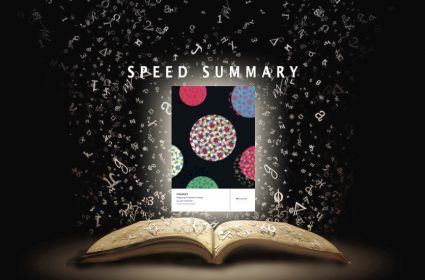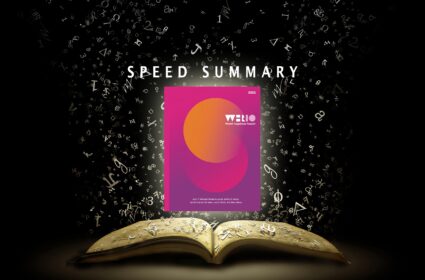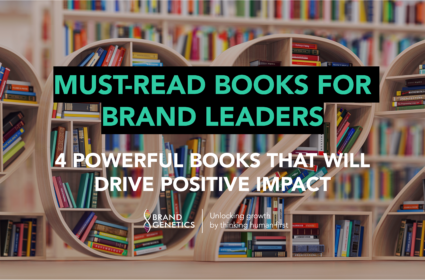Speed Summary: iGen – Why Today’s Super-Connected Kids Are Growing Up Less Rebellious, More Tolerant, Less Happy
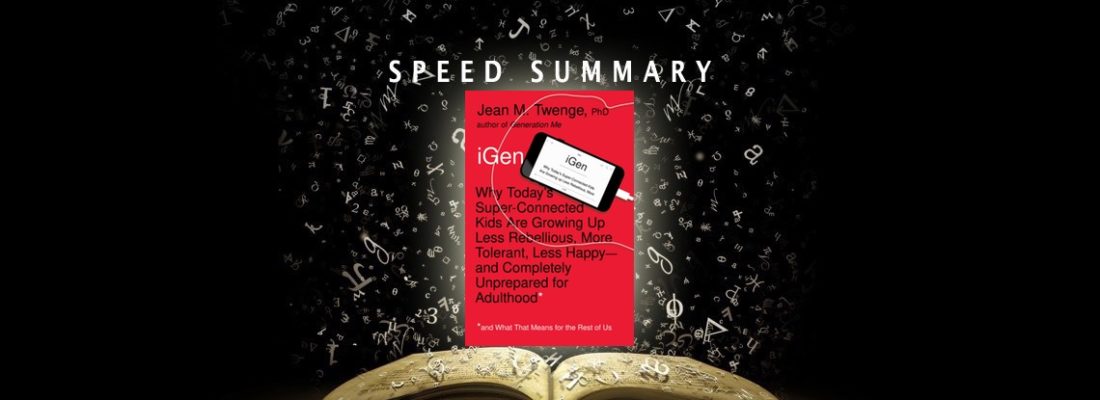
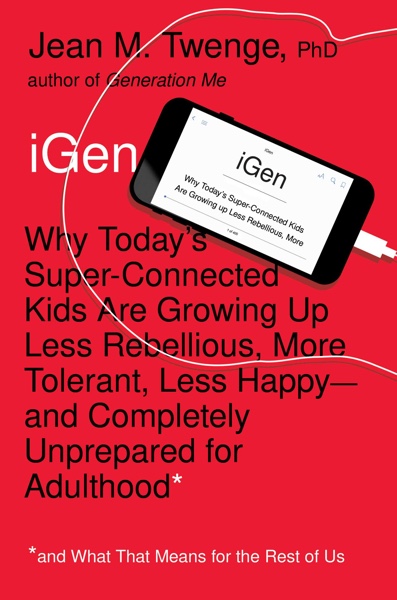
- iGen
- Author: Jean M. Twenge
- Publisher: Atria
- Publication: 2017
How do brands connect with Generation Z, the latest youth demographic emerging into adulthood? Here are seven evidence-based insights from Dr. Jean Twenge – a leading psychologist specializing in generational differences – from her latest book iGen.
Sandwiched between Millennials (also dubbed Gen-Y) and the new Generation A, Gen-Z is the generational cohort born between the mid-1990s through to 2012. With 1995 marking the birth of the World Wide Web, Gen-Z is the first generation comprising only of digital natives, which is why Twenge prefers to dub Generation Z, the iGen.
- Inclusive – Gen-Z are growing up in a VUCA world – volatile, uncertain, changing and ambiguous. In such a world, there are no certainties and no absolutes. Everything is fluid. As a result, Gen-Z identity is fluid, and change and diversity are championed. Gen-Z is the first generational cohort for which the majority does not identify as exclusively heterosexual (only 48% identify as exclusively heterosexual). As we’ve seen Facebook offers 58 different genders. Demographics are fluid too, for the first time, white Caucasians are a minority in the US among young Gen-Z’ers. One in four Gen-Z are Hispanic, and 5% are multi-racial
- Super-Connected: Living on Internet Time – The world of Gen-Z has been shaped by mobile digital technology. If ‘Millennials’ were the connected generation, then Gen-Z is hyper-connected. And they are different. Gen-Z is the first generation of genuine digital natives, born into a mobile world of multimedia bits and bytes. An estimated 96% of Generation Z owns a smartphone, and for Gen-Z email is ancient, and even old-school texting (with text) is getting less popular, and being supplanted with mobile video and image-based communication. A typical day for Gen-Z involves 2 hours of instant chat, 2 hours streaming and surfing, 1 ½ hours on social media, and another 1 ½ hours playing games on smartphones and consoles. Life is a life lived online. Media-wise, what’s gone is tradition print media. In 2000, over 50% of 10th graders read magazines and newspapers at least once a week, now it’s just 10%. And at 12th Grade, the proportion reading a book or a magazine on a daily basis has plummeted from 40% in 2000 to 15% today.
- In Person No More: I’m with You, but Only Virtually – Gen-Z not only live their lives online, they live their relationships online. Meeting people IRL – in real life – is so yesteryear. Only a third of 12th graders see friends socially on a daily basis, down from nearly 50% in 2000. Only half attend parties once a month, down from 70% in 2000. Many have friends online who they have never met in real life. Whereas a majority would go out to the movies at least once a month, now it’s a minority. Shopping trips are down too. That means Gen-Z is more insular, spending more time home-alone. This is the FOGO generation – fear of going out. But the result is that Gen-Z is feeling increasingly lonely and isolated. Nearly 1/3 of 12th Graders say they frequently feel lonely, a proportion that has nearly doubled over the last 10 years.
- In No Hurry: Growing Up Slowly – Gen-Z engages in the world cautiously, even reluctantly. Whereas Millennials had accelerated childhoods, enthusiastically engaging in ‘adulting’, Gen-Z is in no rush to embrace adulthood. As teens, Gen-Z is less likely to go out without their parents, date, have sex, drive or drink. For example, Gen Z is more than 15% less likely to go out without their parents than their Millennial predecessors when they were of their age. They are more than 10% less likely to have a driving license in 12 Grade. And only one in two of these Gen-Z 12th graders has ever dated, down 20% since 2000. Another example, in 2000, one in two 8th Graders had tried alcohol. That’s halved today. Only one in four have tried alcohol. It seems that Gen-Z are in no rush to adopt the behaviors associated with adulthood. Why? It could be down to changing parenting styles, or an adult world that is perceived as less appealing.
- Insecure: The New Mental Health Crisis – The world of Gen Z has been shaped by growing up in post 9/11 world with security threats and a relentless media focus on terrorism. The alt- name for Gen-Z is the Homeland Generation. Many have experienced ‘helicopter parenting’ from worried parents first hand. And the childhood of Gen-Z has been patterned by the greatest financial crisis and recession in living memory. For Gen-Z everything is not awesome. Instead, Gen-Z is more anxious, stressed, and even depressed than Millennials. Nearly 30% of girls and 20% of boys; 6.3 million teens have an anxiety disorder that impedes their daily function according to the National Institute of Mental Health. In the last decade, the percentage of 12-17 year-olds experiencing a major depressive episode has increased by 50%, and the suicide rate for young female teens has more than doubled. Overall, life satisfaction has plummeted for Gen-Z more than 10% in recent years. Combined with the side effects of digital technology – sleeping less and seeing people in person less – the mental health and resilience of Gen-Z is under attack.
- Safety-First: In a world perceived as uncertain and unsafe, Gen-Z is living life in search of safe spaces. Physical safety, emotional safety, and even nutritional safety matter more to this safety-first generation that is more risk-averse than previous generations. For example, the proportion of 8th and 10th graders who say they like to test themselves every now and then by doing something a little risky has dropped by nearly 10% in the last decade, as has the proportion who say they get a kick out doing things that are a little dangerous. Gen-Z today is more than twice as likely to wear a seatbelt in a car than Millennials were when they were Gen-Z’s age. For emotional safety, Gen-Z seek out ‘safe spaces’, request ‘trigger word’ warnings, and action against micro-aggressions (unintentional harmful comments). Across the US, the number of speakers that have been ‘disinvited’ from college campuses for challenging or offensive views has increased 800% since 2000.
- Neo-dystopians – Gen-Z is turning out to be fiercely independent and realistic about a challenging world. Growing up on a diet of dystopian young adult fiction and movies, with Jlaw’s Katniss as the OG in the Hunger Games trilogy. And like Katniss, Gen-Z refuse to conform to stereotypes, convention, and authority. They embrace diversity and freedom and are skeptical of big government and big business. For example, Gen-Z is less trusting of government than previous generations. Whilst the majority of 12th graders believed the federal government was doing a good job in 2000, now it’s less than 1 in 4. Overall, trust in government has dropped 10% since 2000. As a result, Gen-Z is less likely to support big government or government regulation – whether on matters of abortion, marijuana, gun control or environmental regulation. For Gen-Z, there’s no immutable right or wrong to legislate for or against, it’s up to the individual. Freed from the irrational exuberance that characterized Millennials, perhaps Gen-Z see the world for what it is?
The BG Take
There are many saccharine – and largely fictitious – accounts of Gen Z traits available (many of which look suspiciously like older reports with Y or Millennial crossed out and simply replaced with Z). What separates Twenge’s analysis is the use of compelling large-scale age-matched generational data comparing Gen-Z now to previous generations when they were the age that Gen-Z is now. This allows for a genuine comparison and removes general traits associated with youth (e.g. easy adoption of new technology, wanting to change the world). Twenge’s data also allows for some debunking of some Gen-Z myths. For example, Gen-Z are not more entrepreneurial than Millennials (in fact they work less, and are less likely to want to own their own business). Nor are they more religious (in fact they affiliate less with religion, attend fewer religious services). The myth-busting and cliché-stripping nature of Twenge’s iGen makes for a compelling read and a useful source of insight. Moreover, as a psychologist, Twenge helps the reader get into the head of this generation, and provides a useful understanding of the Gen-Z mindset. Recommended.

